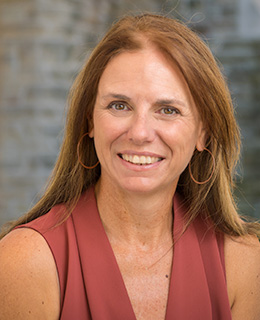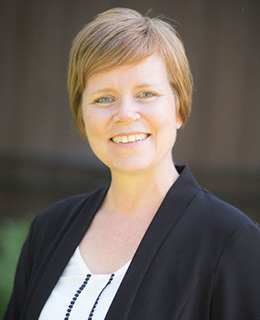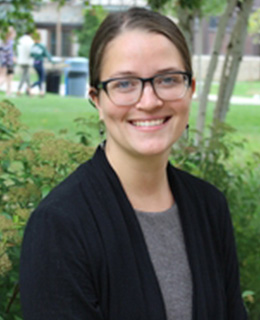Sep 24, 2022 | 1:00 PM - 2:30 PM
Allyson Larkin, PhD
The End Of International Experiential Learning? Rethinking Global Higher Education Pedagogy In Response To The Climate Crisis
 While climate scientists urgently warn governments to take action to avoid a global climate catastrophe, the response within higher education has been uneven and often unclear. Most campuses have implemented recycling, energy reduction and other biodiversity support programs, however, Internationalization remains a top priority. Locally, experiential learning opportunities are increasing as strategic mandate agreements target these pedagogies as a measure of program value and funding. This research examines the gaps between internationalization in higher education and climate responsibility to participate in carbon reduction targets. What are the contradictions between programs that involve travel and mobility versus the need to radically reduce carbon emissions in higher education policy? What is the impact for expanding international student enrolments in a time of climate crisis? When and how is travel essential for academic experience?
While climate scientists urgently warn governments to take action to avoid a global climate catastrophe, the response within higher education has been uneven and often unclear. Most campuses have implemented recycling, energy reduction and other biodiversity support programs, however, Internationalization remains a top priority. Locally, experiential learning opportunities are increasing as strategic mandate agreements target these pedagogies as a measure of program value and funding. This research examines the gaps between internationalization in higher education and climate responsibility to participate in carbon reduction targets. What are the contradictions between programs that involve travel and mobility versus the need to radically reduce carbon emissions in higher education policy? What is the impact for expanding international student enrolments in a time of climate crisis? When and how is travel essential for academic experience?
Shawna Lewkowitz, MA
Climate Activism and the Power of Local Experiential Learning
 Higher education institutions have a responsibility to address the climate crisis and to seek new ways to deepen student learning on environmental issues through theory and practice. Student desire for courses and experiences that address our most pressing problems is high, and local experiential learning programs have a transformative potential to connect students’ in-class learning with on-the-ground activism and advocacy work.
Higher education institutions have a responsibility to address the climate crisis and to seek new ways to deepen student learning on environmental issues through theory and practice. Student desire for courses and experiences that address our most pressing problems is high, and local experiential learning programs have a transformative potential to connect students’ in-class learning with on-the-ground activism and advocacy work.
Through King’s University College’s Social Justice and Peace Studies - Community Based Learning class, students, faculty, and local partners have demonstrated the impact that working alongside both grassroots and more established environmental non-profits in the community can have. Using case studies from student and community partner experiences, we make the case for the transformative power of local experiential learning to mobilize climate activism and make real substantial environmental changes in the community. Connecting the potential of institutions (the university), individuals (students) and community organizations (environmental non-profits) this research explores ways to address the climate crisis and the possibilities for mobilizing local actions to strengthen community resiliency in response to climate change.
Klaire Gain, MA
Eco-Anxiety And Global Solidarity: New Networks Of Climate Activism In A Time Of Crisis
 Feelings of anxiety, grief, and apathy in connection to our current climate crisis are increasingly reported, particularly amongst youth. Given the rise of ecological grief, how can we support our students in climate action? International solidarity delegations have long provided an opportunity for students to turn apathy into activism through solidarity building, but at what cost? Through a case study of international experiential learning in the Dominican Republic, this research examines the benefits and challenges of international student solidarity networks given the severity of the climate crisis. While students have reported ‘life-changing’ experiences through participation in this program, how can we reconcile the carbon footprint of international travel in a time of crisis? Is it possible to foster global justice movements while maintaining our individual and institutional responsibilities to mitigate the climate crisis?
Feelings of anxiety, grief, and apathy in connection to our current climate crisis are increasingly reported, particularly amongst youth. Given the rise of ecological grief, how can we support our students in climate action? International solidarity delegations have long provided an opportunity for students to turn apathy into activism through solidarity building, but at what cost? Through a case study of international experiential learning in the Dominican Republic, this research examines the benefits and challenges of international student solidarity networks given the severity of the climate crisis. While students have reported ‘life-changing’ experiences through participation in this program, how can we reconcile the carbon footprint of international travel in a time of crisis? Is it possible to foster global justice movements while maintaining our individual and institutional responsibilities to mitigate the climate crisis?
Biographies
Allyson Larkin, PhD
Allyson Larkin is an Associate Professor and department Chair of the Social Justice and Peace Studies program at King's University College at Western University. Her current research explores the intersections between higher education internationalization, the climate crisis, and international experiential learning. Her most recent publications include, “Fair trade learning in an unfair world.” in the Journal of Global Citizenship and Equity Education, “Seeking Global Citizenship through International Experiential/Service Learning and Global Citizenship Education: Challenges of power, knowledge, and difference for practitioners” in The PalgraveMacmillan Handbook of Global Citizenship Education, and “Decolonizing and delinking North-South higher education partnerships: Imagining possibilities for global social justice.” in Assembling the Higher Education Institution: Considerations of Democracy, Social Justice and Leadership.
Shawna Lewkowitz, MA
Shawna Lewkowitz is a PhD candidate in the department of Geography at Western University. Her research examines public space, gender, and sexuality, with a particular interest in pedagogy and experiential learning.
Klaire Gain, MA
Klaire Gain is PhD candidate in the department of Global Health Sciences at Western University. Her PhD research focuses on the gendered impacts of open-pit mining in the Dominican Republic and transnational activism.


